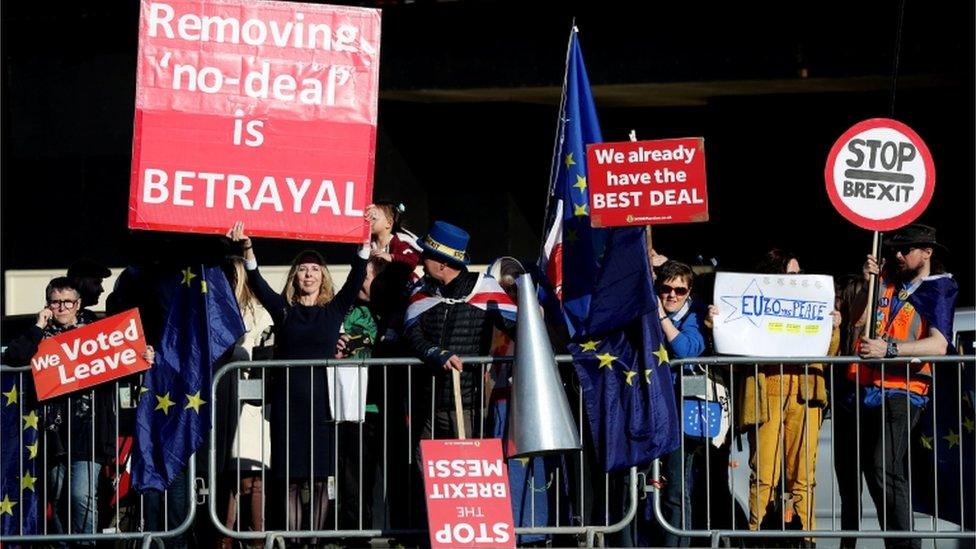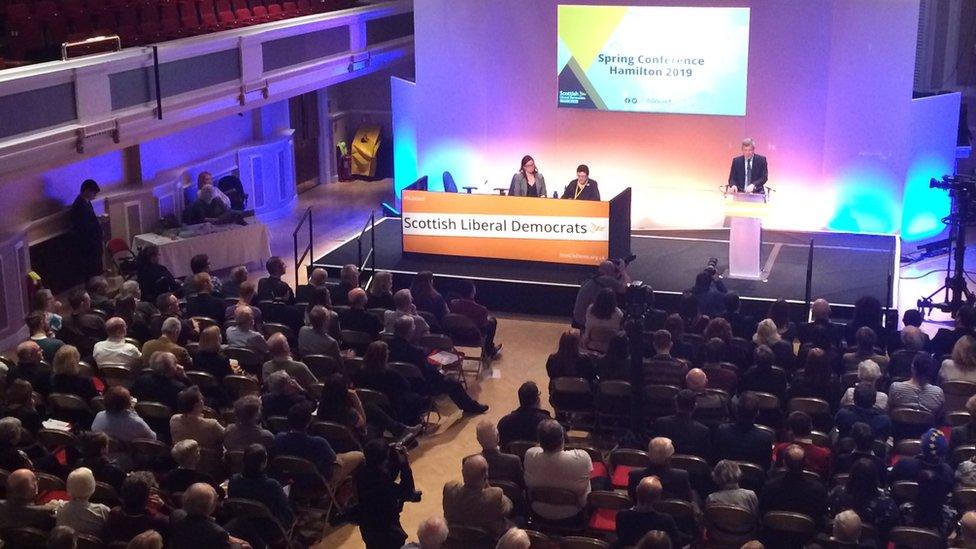A shift in the Brexit logjam
- Published

And, so, a few changes. Faintly grudging. With caveats. But change nevertheless, a shift in the seeming blockage that is Brexit.
In the Commons, the prime minister signals that, after all, it may well be the case that a no deal Brexit is thwarted, that the departure date is postponed.
At Holyrood, Richard Leonard tells me that Remain must be an option on the ballot paper if there is to be a further EU referendum. If, note.
Both initiatives, of course, are driven in large part by noises off. By alarums and excursions from those who have left the stage or, more precisely, their former parties.
Discourse, generally, has become cyclical. Opponents, understandably, complain that the prime minister is "running down the clock" to Brexit.
You can almost sense her shifting irritably on the Treasury bench. She probably yearns to bellow: "Well, of course, I'm running down the blasted clock. What else do you expect me to do?"
But she doesn't. She repeats the syllogism that those who seek to prevent no deal ought to give up and back her proposed agreement. Once, that is, it has been tweaked somewhat after talks with the EU.
Delivering that line to the SNP's Ian Blackford, she added: "Simples!" All around her, colleagues and opponents* alike gasped. They had not thought that the vicar's daughter was familiar with demotic televised culture.
(*The colleagues are all on the Tory benches. Mrs May's opponents are scattered throughout the House.)
Theresa May: "An extension cannot take no deal off the table."
But Mrs May had more. She offered a new structure. The House will hold a second "meaningful vote" on or by the 12th March (the phrase "meaningful vote" is presumably designed to set it apart from the sententious twaddle which will fill the gap until then).
Should that fail, MPs would then be invited to choose the option of leaving without a deal. With that vote, then, the House could forestall no deal. Should that fail in its turn, the UK government would offer a "short, limited extension" to Article 50.
It would be, you see, in the hands of the House. But such flexibility only goes so far. Mrs May appealed to the Commons to respect the constitutional rights of Her Majesty's government too.
If government rights and privileges were entirely supplanted, then democracy itself would be threatened.
All around her, both colleagues and opponents (*see above) looked faintly mutinous. So, give me that again slowly, you could see them thinking.
When the Chief Whip threatens me with a year scrutinising subordinate legislation if I don't back the minister, he is simply protecting the ancient and venerable structure of democracy. OK, got it.
Running down the clock
Seriously, I understand what the PM is arguing. Parliamentary democracy rests upon a careful balance. Yes, MPs have rights. And responsibilities. But, for governance to function, ministers must be able to rely upon wielding a certain degree of power. Most notably over finance.
To be clear, the PM is still running the clock down. Her presumption is that, if she waits long enough, the EU will concede something.
Not the withdrawal of the Irish backstop. That is unthinkable, not least for the Irish - who are, remember, a continuing EU state and thus a big deal in Brussels.
Not the renegotiation of the withdrawal agreement. That has been, as Ian Blackford noted, repeatedly rejected.
But perhaps a codicil to the agreement, outlining circumstances in which resiling from the backstop might be contemplated.

The Scottish Lib Dems were keen to stress their long-standing support for a new referendum at their conference in Hamilton
The PM's hope is that such a concession, minor though it might seem - and indeed is - could, conceivably, perhaps, maybe, on a good day, be enough to get through a weary, fretful, disquieted, Commons.
That, in short, provided she waits long enough, sufficient numbers of her colleagues and opponents will blink first.
Which brings us to Labour and to the plan for a potential second referendum. This scheme has a lengthy, indeed protracted genesis.
At the weekend, I could have been watching Dundee United, cruelly denied a rightful victory. Or I could have watched the rugby on the telly, thrilling to the spectacle of a Scotland team who appeared keen to chuck the ball to opponents as frequently as to colleagues.
Instead, dedicated soul that I am, I was in Hamilton. At the Scottish Liberal Democrat conference. When not playing the ukulele, delegates spent every waking moment stressing the need for a second referendum - and reminding each other that it was a Lib Dem wheeze.
The SNP came somewhat late to that notion, apparently fearful of setting a precedent for decisions about independence. Would that also require a confirmatory poll on the outcome of negotiations with London?
But, now, they have the zeal of the convert. And, finally, Labour have joined in. Or, at least, they reserve the option of a second ballot - if the Commons rejects their revised proposals for Brexit.

Richard Leonard argues that a new Brexit referendum should be a choice between Remain and a "credible Leave option"
On the Nine last night, Labour's Neil Findlay repeatedly declined to say whether Remain would be on that second ballot paper. And I mean repeatedly.
(Incidentally, did you catch the Nine? On the new BBC Scotland channel? I certainly did. An admirable overture, I thought. Good stuff all round.)
By today, further clarity arrived. Richard Leonard told me that Remain must be on the ballot paper - although he joined Mr Findlay in stressing that Labour's revised Brexit proposals must be tested first.
I put to Mr Leonard the point that Labour were already being accused of "betraying" those who voted for Brexit in the belief that the outcome of the 2016 referendum would be respected.
Labour, he argued, had tried diligently to do that. Labour continued to essay such an endeavour, through advancing its own multi-point plan for Brexit. But the Commons was in evident disarray. There was turmoil and confusion, helping nobody.
From the SNP, Labour face the alternative accusation - that they are still prepared to sanction Brexit, albeit in revised form, ahead of a second referendum.
For Labour, it is a tricky calculation. They have MPs like John Mann warning that they will lose support in the North and Midlands of England by this latest manoeuvre; that they have written off the next election.
They have a broader electorate, yearning for something, anything, to end the logjam.
Which is, for now, where we are. Deploying Euclidean geometry to calculate which option will, ultimately, arise from the present morass.
